|
|
|
Sort Order |
|
|
|
Items / Page
|
|
|
|
|
|
|
| Srl | Item |
| 1 |
ID:
123015
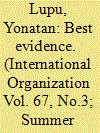

|
|
|
|
|
| Publication |
2013.
|
| Summary/Abstract |
Independent domestic courts play important roles in enforcing international human rights agreements, thereby providing a mechanism by which international institutions can affect government policy. Yet this enforcement power is constrained not only by independence but also by the courts' ability to overcome information problems. Domestic courts' enforcement power depends on information in two ways: the costs of producing legally admissible evidence of abuses and the applicable legal standards of proof. When countries ratify international agreements, judicial enforcement can improve government practices when evidence-production costs and standards of proof are low, but not otherwise. With respect to personal integrity rights violations, evidence is especially difficult to obtain, and standards of proof are high, meaning that the courts will not be able to constrain government practices. By contrast, evidence-production costs and standards of proof are lower for other civil rights violations, so courts will be able to prosecute offenders and bring governments into line with their international commitments. Consistent with this theory, I find that commitments to the International Covenant on Civil and Political Rights (ICCPR) have significantly improved governments' respect for the freedoms of speech, association, assembly, and religion. With respect to personal integrity rights, however, I find that commitments to the ICCPR have not improved government practices.
|
|
|
|
|
|
|
|
|
|
|
|
|
|
|
|
| 2 |
ID:
153924
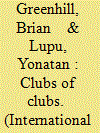

|
|
|
|
|
| Summary/Abstract |
Has international cooperation become fragmented in recent decades? We focus on a specific form of potential fragmentation in the international system: the extent to which the network of intergovernmental organizations (IGOs) consists of distinct clusters of closely cooperating states. IR scholars—including those with an interest in the causes and consequences of membership in IGOs—pay relatively little attention to the structure of the larger IGO network. At the same time, scholars concerned with fragmentation often assume that it has increased without clear measures of this phenomenon. We use the network analytic technique of modularity maximization to show that throughout the post–World War II period, the structure of the IGO network can generally be divided into distinct groups of states on the basis of their shared IGO memberships. Yet we also show that temporal trends indicate that the IGO network has become less fragmented in recent decades, suggesting that cooperation via these organizations has become more global and less regional. Our findings indicate that, at least as far as cooperation through formal organizations is concerned, fragmentation has decreased in recent decades.
|
|
|
|
|
|
|
|
|
|
|
|
|
|
|
|
| 3 |
ID:
181667


|
|
|
|
|
| Summary/Abstract |
How will advances in digital technology affect the future of human rights and authoritarian rule? Media figures, public intellectuals, and scholars have debated this relationship for decades, with some arguing that new technologies facilitate mobilization against the state and others countering that the same technologies allow authoritarians to strengthen their grip on power. We address this issue by analyzing the first game-theoretic model that accounts for the dual effects of technology within the strategic context of preventive repression. Our game-theoretical analysis suggests that technological developments may not be detrimental to authoritarian control and may, in fact, strengthen authoritarian control by facilitating a wide range of human rights abuses. We show that technological innovation leads to greater levels of abuses to prevent opposition groups from mobilizing and increases the likelihood that authoritarians will succeed in preventing such mobilization. These results have broad implications for the human rights regime, democratization efforts, and the interpretation of recent declines in violent human rights abuses.
|
|
|
|
|
|
|
|
|
|
|
|
|
|
|
|
| 4 |
ID:
148039
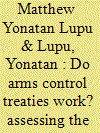

|
|
|
|
|
| Summary/Abstract |
How do international arms control treaties influence state policies? This article investigates this question by analyzing the efficacy of the nuclear Nonproliferation Treaty (NPT). Despite fierce debate over the last several decades, scholars still lack a full understanding of whether or not the treaty “works.” This debate persists, in part, because existing studies suffer from a key limitation: they are not designed to infer a causal connection between NPT membership and nuclear proliferation. Prior research cannot determine whether membership in the treaty restrains states from developing nuclear weapons or simply reflects existing preferences. To address this limitation, this article accounts for selection effects by using a measure of states’ ex ante treaty commitment preferences. Our analysis of nuclear proliferation from 1970 to 2000 provides evidence that the NPT has played a key role in curbing the spread of nuclear weapons. Even after accounting for strategic selection into the treaty, NPT ratification is robustly associated with a lower likelihood of pursuing nuclear weapons. Our results not only matter for debates over the NPT and nonproliferation but also have broad implications for the study of how international institutions affect international politics.
|
|
|
|
|
|
|
|
|
|
|
|
|
|
|
|
| 5 |
ID:
156662


|
|
|
|
|
| Summary/Abstract |
Existing work has shown that membership in intergovernmental organizations (IGOs) can, among other outcomes, reduce conflict, promote democratization, and shape crisis bargaining. The traditional approach to studying how IGOs can reduce conflict has focused on the effects of dyads’ direct ties to IGOs. In doing so, these analyses use fairly simple counts of the number of IGOs to which the states in each dyad share membership. We argue that this approach is too narrow; we instead consider the effects of higher-order groupings within the IGO network, which we call IGO clusters. Within these IGO clusters, states share relatively many IGO connections with each other, both directly and through indirect links through third parties, fourth parties, and so on. The effects of indirect IGO ties are especially important within such structures. We use a modularity maximization approach to detect clusters within the IGO network. We find robust empirical support for our hypothesis that the pacifying effect of IGO membership stems from the extent to which pairs of states are more deeply embedded within the wider IGO network. Indeed, we find that once we account for states’ shared membership in clusters of IGOs, the simpler dyadic measure of shared IGO membership no longer shows evidence of a conflict-inhibiting effect.
|
|
|
|
|
|
|
|
|
|
|
|
|
|
|
|
| 6 |
ID:
116179
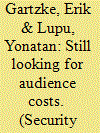

|
|
|
| 7 |
ID:
168543


|
|
|
|
|
| Summary/Abstract |
Enforcement of international law is often delegated to national courts, creating a space for them to play a part in international judicialization. Under what conditions can they do so? We argue that the answer depends on the relationship between the political and legal constraints national courts face. National courts must be careful to safeguard their independence in the face of potential backlash, but they face constraints in terms of the legal mechanisms available to them when enforcing international law. We focus on the availability of two legal mechanisms: direct effect, under which courts apply treaties directly, setting aside inconsistent domestic laws; and canons of interpretation, under which courts strive to interpret domestic laws in conformity with treaties. We find that the effects of human rights treaty ratification is greater when courts have the canon available to them than it is when courts have direct effect available to them.
|
|
|
|
|
|
|
|
|
|
|
|
|
|
|
|
| 8 |
ID:
190760


|
|
|
|
|
| Summary/Abstract |
How does targeting in armed conflict affect public opinion in conflict zones? Armed actors choose between targeting militaries and civilians, further choosing whether to target civilians discriminately or indiscriminately. Existing work suggests these choices have important implications for conflict dynamics, in part by influencing public opinion, yet the causal effects of these choices on individual attitudes have not been clearly established. We conduct a survey experiment in the Donbas region of Ukraine, an area that has witnessed years of protracted fighting. We find that reports of civilian targeting robustly reduce approval of both the government and separatist forces. However, we find that the effects of discriminate civilian targeting are not statistically distinguishable from those of indiscriminate civilian targeting. Finally, we find that our respondents generally preferred a restrained, rather than reciprocal, response from actors in this armed conflict. We explain the implications of our findings for theories of wartime violence.
|
|
|
|
|
|
|
|
|
|
|
|
|
|
|
|
| 9 |
ID:
145694


|
|
|
|
|
| Summary/Abstract |
Why do states form non-aggression pacts? Non-aggression pacts are different from typical alliances because the latter tend to be focused on relationships between members of the alliance and other states, such as by deterring external threats or mediating the resolution of conflicts between an alliance member and a third-party challenger. We offer two contributions that build on existing work. First, we provide a theory that explains why leaders use non-aggression pacts as information mechanisms. Leaders of states that have recently emerged from a rivalry seek to overcome an important information asymmetry: they know the probability of future conflict among the former rivals has decreased, but other actors may fear a resumption of hostilities. Such leaders use non-aggression pacts to signal that the rivalry has truly ended and that future relations are likely to remain peaceful. Second, our analysis recognizes the often multilateral nature of the non-aggression pact formation process. We use the ‘k’-adic statistical procedure to model non-aggression pact formation as a multilateral process. To operationalize recent rivalry cessation within a group, we use a network analytic density measure. Consistent with our theory, we find that groups of states with greater densities of recently ended rivalries are significantly more likely to form non-aggression pacts. These results hold across a series of model specifications.
|
|
|
|
|
|
|
|
|
|
|
|
|
|
|
|
| 10 |
ID:
125121
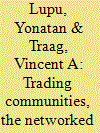

|
|
|
|
|
| Publication |
2013.
|
| Summary/Abstract |
The authors argue that theories regarding the relationship between trade and conflict could benefit greatly from accounting for the networked structure of international trade. Indirect trade relations reduce the probability of conflict by creating (1) opportunity costs of conflict beyond those reflected by direct trade ties and (2) negative externalities for the potential combatants' trading partners, giving them an incentive to prevent the conflict. Trade flows create groups of states with relatively dense trade ties, which we call trading communities. Within these groups, the interruptions to trade caused by conflict create relatively large costs. As a result, joint members of trading communities are less likely to go to war; however little they directly trade with each other. The authors systematically measure and define trading communities across various levels of aggregation using the network analytic tool of modularity maximization. The authors find significant support for their hypothesis, indicating that interdependence theory can be extended to extra-dyadic relations.
|
|
|
|
|
|
|
|
|
|
|
|
|
|
|
|
| 11 |
ID:
112470


|
|
|
|
|
| Publication |
2012.
|
| Summary/Abstract |
World War I is generally viewed by both advocates and critics of commercial liberal theory as the quintessential example of a failure of economic integration to maintain peace. Yet this consensus relies on both methodologically flawed inference and an incomplete accounting of the antecedents to the war. Crucially, World War I began in a weakly integrated portion of Europe with which highly integrated powers were entangled through the alliance system. Crises among the highly interdependent European powers in the decades leading up to the war were generally resolved without bloodshed. Among the less interdependent powers in Eastern Europe, however, crises regularly escalated to militarized violence. Moreover, the crises leading to the war created increased incentives for the integrated powers to strengthen commitments to their less interdependent partners. In attempting to make these alliances more credible, Western powers shifted foreign policy discretion to the very states that lacked strong economic disincentives to fight. Had globalization pervaded Eastern Europe, or if the rest of Europe had been less locked into events in the east, Europe might have avoided a "Great War."
|
|
|
|
|
|
|
|
|
|
|
|
|
|
|
|
| 12 |
ID:
148322


|
|
|
|
|
| Summary/Abstract |
Preferences are crucial to the analysis of many key questions regarding international institutions. This article analyzes the key predictors of states’ preferences over universal treaties. It does so by using a spatial-modeling approach that conceptualizes a treaty commitment preference space that includes agreements across multiple policy areas. I analyze the treaty commitment preference space in order to better understand the key dimensions of these preferences. I find that economics, and particularly trade, is the clearest and most consistent predictor of treaty commitment preferences, including with respect to many treaties in noneconomic policy areas.
|
|
|
|
|
|
|
|
|
|
|
|
|
|
|
|
|
|
|
|
|